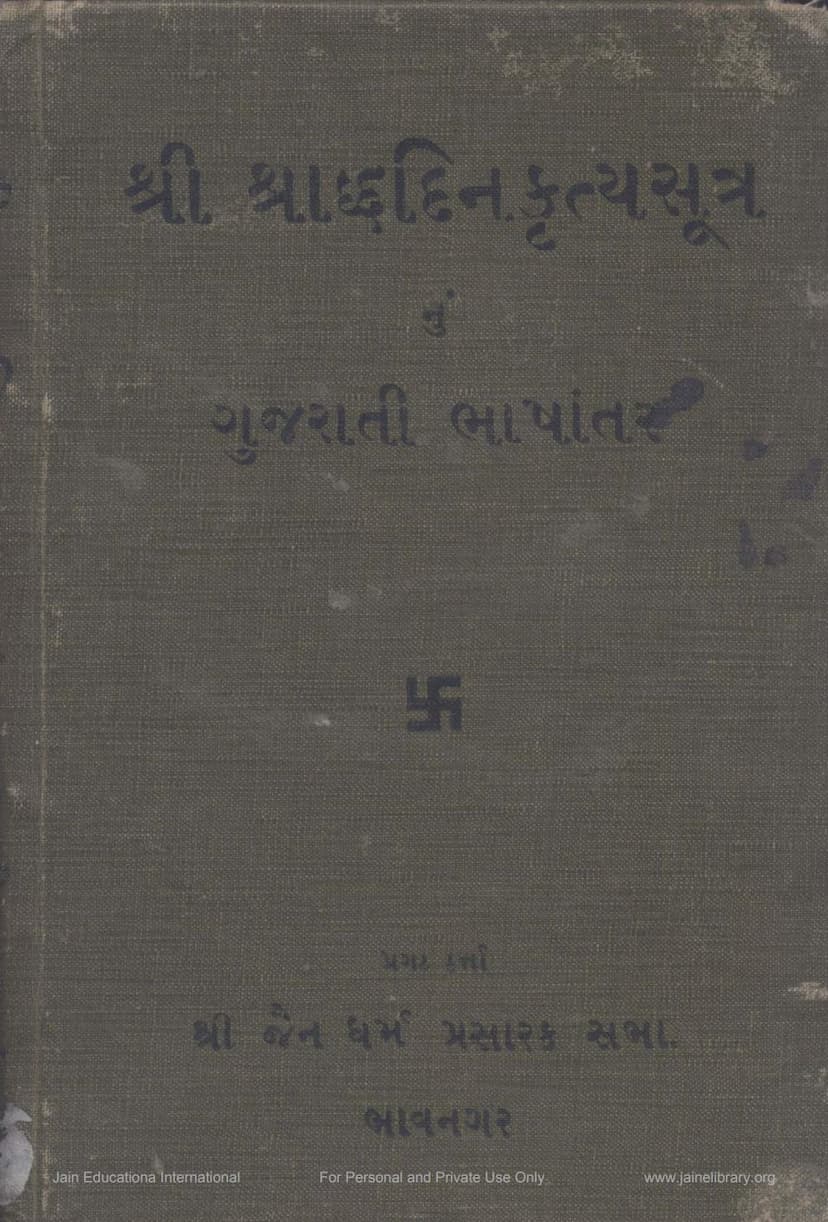Sharddhdin Krutya Sutra
Added to library: September 2, 2025

Summary
Here's a comprehensive summary of the Jain text "Shraddhdin Krutya Sutra" based on the provided pages:
Book Title: Shraddhdin Krutya Sutra Author(s): Jain Dharm Prasarak Sabha (likely the publisher/compiler) Publisher: Jain Dharm Prasarak Sabha Catalog Link: https://jainqq.org/explore/005333/1
Overall Purpose:
The "Shraddhdin Krutya Sutra" (also referred to as "Shraddh Din Krutya Sutra") is a Jain scripture intended to guide lay followers (Shravaks and Shravikas) in their daily conduct and religious observances. The preface highlights that while other Jain texts exist, this scripture is particularly useful for those with less intellectual capacity, providing a concise guide to their daily duties. The book is structured into 29 "Dwar" (sections or chapters) covering various aspects of a religiously observant life.
Key Themes and Content:
The text aims to outline the prescribed daily routine and ethical conduct for Jain lay followers. It emphasizes the importance of:
- Devotion to Jinas: The scripture details the rituals and significance of worshipping Jinas (Tirthankaras) through various forms of puja (worship), including sensory offerings and devotional practices.
- The Navkar Mantra: The profound significance, chanting methods, and benefits of the Navkar Mantra are elaborately discussed, highlighting its central role in Jain practice.
- Ethical Conduct and Vows: The text explains the principles and nuances of the vows undertaken by lay followers (Shrāvak Vrat), including the strictures and their potential transgressions.
- Daily Rituals (Dinkritya): A significant portion of the book is dedicated to outlining the daily rituals that a devout Jain should perform, from waking up and reciting mantras to engaging in virtuous activities throughout the day.
- Importance of Right Faith (Samyak Darshan): The text stresses that true spiritual progress is rooted in right faith, without which other practices are considered futile.
- The Role of a Guru: The scripture details the reverence and respect due to spiritual preceptors (Gurus) and the importance of listening to their teachings.
- Charitable Giving (Daan Dharma): Various types of charitable donations, particularly to monks and the monastic community (Muni Daan), are discussed, along with their benefits. The text also elaborates on the significance of offering lodging (Vasti Daan) and the virtues of supporting fellow community members (Sādharmik Vātsalya).
- Avoiding Harmful Activities: The text lists and explains various activities and professions that are considered detrimental to spiritual progress and should be avoided by Jain followers (e.g., certain types of trade, harmful practices).
- Contemplation and Mindfulness: The scripture encourages introspection and contemplation on the nature of the self, the body, and the impermanence of worldly life.
- The Importance of Good Company (Satsang): The text stresses the benefits of associating with virtuous individuals and the dangers of bad company.
- Discipline and Austerity (Tapas): The concept of fasting and other forms of austerity is discussed, particularly in relation to daily observances.
- Moral Teachings and Stories: The book incorporates numerous stories and parables to illustrate the ethical and spiritual principles being conveyed. These stories often highlight the consequences of virtuous actions and the pitfalls of vices.
- The Value of Human Life: The rarity and preciousness of human birth are emphasized, urging readers to utilize it for spiritual upliftment.
- Purity of Intention and Action: The text underscores that true devotion and religious practice stem from a pure heart and righteous actions.
Structure and Content Breakdown (based on the Index and early pages):
The book is meticulously structured, starting with auspicious beginnings (Mangalacharan) and then delving into the 29 "Dwar" (sections). Some of the prominent sections covered include:
- Dwar 1: Waking up while remembering the Navkar Mantra.
- Dwar 2: Self-inquiry, asking "Who am I?".
- Dwar 3: Understanding the rules and breaches of Shravak vows.
- Dwar 4: Contemplations on penances related to evening rituals.
- Dwar 5: Rituals for worshipping Jinas and cleaning the idol.
- Dwar 6: Taking vows in the presence of deities.
- Dwar 7: The process of visiting Jain temples (Chaitya Gaman).
- Dwar 8: The specific rituals for entering the inner sanctum of a temple.
- Dwar 9: The method of Bhavpūjā (mental worship).
- Dwar 10-13: Veneration of Gurus, listening to religious discourses, and caring for the sick or elderly monks.
- Dwar 14: Understanding and avoiding wrong conduct (Vyavahar Shuddhi), including the rejection of 15 types of professions.
- Dwar 15: The duties at mealtimes, including feeding monks and sharing meals with fellow devotees.
- Dwar 16: Performing post-meal expiations and daily study (Swadhyaya).
- Dwar 17: The various categories of Shravaks.
- Dwar 18: Evening rituals and temple visits.
- Dwar 19: Performing Samayik (a specific form of meditation) and its importance.
- Dwar 20: The rituals of Pratikraman (confession and atonement).
- Dwar 21: Service to monks (Sādhū Vaiyaavach).
- Dwar 22: Giving religious sermons to family.
- Dwar 23: Proper sleeping habits and contemplation.
- Dwar 24: Taking refuge in the Four Sharan (Arhat, Siddha, Sadhu, Dharma).
- Dwar 25: Contemplating the nature of the female body and its impurity.
- Dwar 26: Praising those who observe chastity.
- Dwar 27-28: Describing the sorrows of worldly existence and the means to overcome them.
- Dwar 29: Reflecting on the importance of the teachings of the Guru and the path to liberation.
Publisher's Note:
The publication by Shri Jain Dharm Prasarak Sabha highlights their effort to translate and disseminate this important text. They express gratitude to those who assisted in the translation and compilation, acknowledging the value of the contained teachings for modern Jain society.
In essence, the "Shraddhdin Krutya Sutra" serves as a practical manual for Jain householders, offering a comprehensive framework for living a spiritually disciplined and ethically upright life, grounded in the teachings of the Tirthankaras.